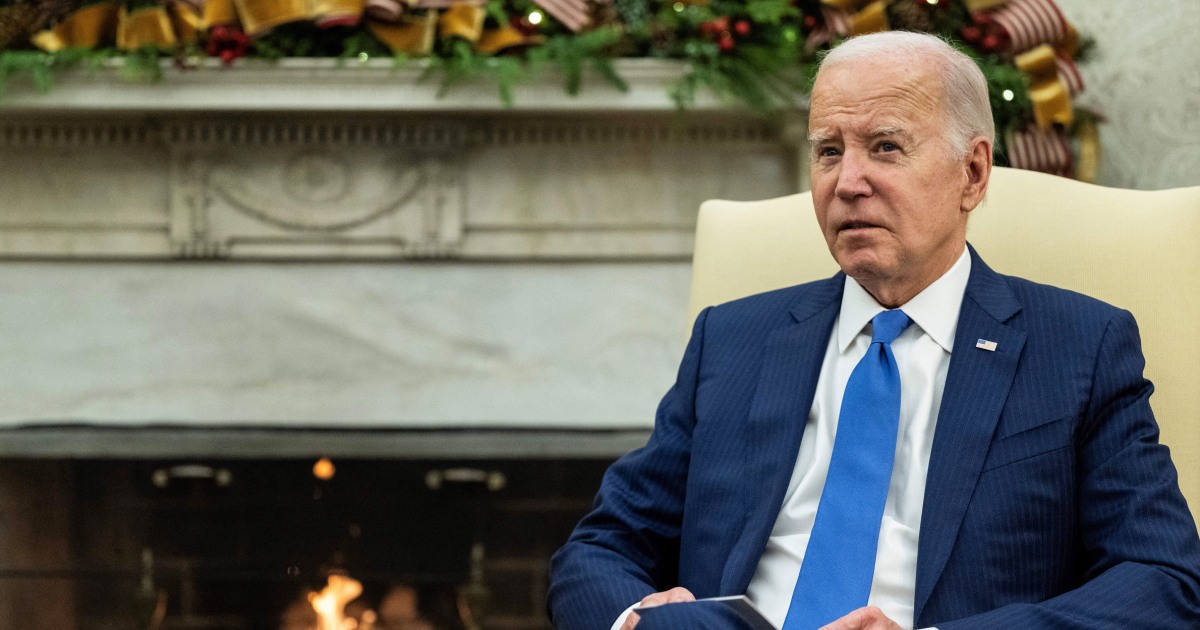
In border debate, White House shows GOP leaders the receipts
After months of intense and detailed talks, Sen. Chris Murphy indicated over the weekend that negotiators have reached an agreement on a package that would address border policy, immigration reforms, and aid to Ukraine. “We do have a bipartisan deal,” the Connecticut Democrat told CNN. “We’re finishing the text right now.”
Aside from the key players involved in the process, the details of the agreement are scarce, though as Politico reported, proponents believe a Senate vote could come quite quickly.
Senators could vote on a bipartisan immigration deal as soon as next week, one of the top negotiators said Sunday. But first, they have to sell it to their members. And that part is looking tricky.
Murphy summarized the broader dynamic nicely: “The question is whether Republicans are going to listen to Donald Trump, who wants to preserve chaos at the border, because he thinks it’s a winning political issue for him, or whether we are going to pass legislation which would be the biggest bipartisan reform of our border immigration laws in 40 years and would give the president of the United States, whether that president is a Republican or a Democrat, new, important power to be able to better manage the flow of people across the border.”
President Joe Biden, meanwhile, appears to be upping the ante, issuing a written statement on Friday night saying he’s prepared to use new emergency authorities to “shut down the border when it becomes overwhelmed” — but only if Congress approves the pending, bipartisan package.
A day later, the Democrat reiterated the position, apparently in the hopes of giving the burgeoning legislation an added boost.
At least for now, House Republicans have condemned the bipartisan agreement, and House Speaker Mike Johnson declared on Friday that the emerging deal — if it actually comes together — would be “dead on arrival” in the lower chamber.
As a political matter, Democrats believe this creates an opportunity to turn the tables on the larger debate. After all, the GOP has spent recent years demanding that the president make a deal on border policies, and now Biden is prepared to do exactly that — embracing an agreement that Republican Sen. James Lankford of Oklahoma said would be “by far the most conservative border security bill in four decades.”
If GOP lawmakers refuse to take “yes” for an answer, the argument goes, then it’s Republicans who will bear responsibility for the underlying issue.
GOP leaders, meanwhile, have pushed back against such rhetoric, claiming that Biden doesn’t need to wait for Congress to act; the White House can simply act unilaterally. It’s a flawed argument, in part because every recent administration — including Barack Obama’s and Donald Trump’s — has said it needs statutory changes to the status quo that must come from Capitol Hill.
But just as importantly, GOP leaders themselves have said the same thing.
The White House released a new memo a couple of hours ago, reminding the public of the kind of claims leading House Republicans made in the recent past. As recently as 2019, for example, House Majority Leader Steve Scalise said, “This is a broken system that needs to be fixed. It takes congressional action, you need to change the law.
In early 2023, House Speaker Mike Johnson argued, “America is the most compassionate nation in the world, but our immigration system is broken. Reforming that system is a job for Congress. Just last month, the Louisiana Republican, in a letter to Biden, added, “Statutory reforms designed to restore operational control at our southern border must be enacted.”
It is, in other words, a little late for GOP leaders to claim congressional action is irrelevant.
For his part, House Majority Whip Tom Emmer insisted the other day, “The only reason that President Biden is even interested in discussing this issue is because it has now become a political liability for the White House.”
It’s a tough sell — Biden has been pushing Republicans for an immigration compromise since 2021 — but even if one is inclined to believe Emmer, it leads to an obvious follow-up question: So what?
What matters more now, motivations or results?
No Byline Policy
Editorial Guidelines
Corrections Policy
Source